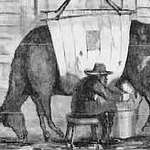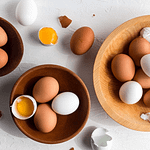Today, Kim shares her experience with a recipe intended to ease the strain of entertaining and leave time for more important matters, like gaining votes for women.
Setting the Table
As we discussed in the last episode, the Woman Suffrage Cookbook is an excellent example of how a cookbook can set a table for a broader conversation about hot button issues affecting the community at large. This book in particular represents so many things: a declarative act by which women could visibly contribute to a cause of their choosing; a medium to share insights and advice meant to ease everyday burdens; and a historical chronicle of the ways and means of late 19th Century homemaking.
But by my modern standards, the recipes were head scratchers - what constituted a “fast oven” and what are “gem pans” and why would anyone boil vegetables for THREE HOURS?!
I realized that I was so very disconnected to the realities of everyday life for the women who participated in developing this cookbook. Judging by the recipes, their ingredients, and their techniques, this generation of women would have been amazed by the sheer volume of innovation available to me today - integrated stovetops and ovens that hold consistent temperatures; commercial foods like sliced loaves of bread; broad selections of prepared foods available frozen or in cans; and tender, crisp vegetables.
But they would have been able to share with me how they developed the patience and tenacity to manage the conflicting laborious tasks of running their homes; how they managed to keep their families healthy and strong; and whether they too longed for the opportunity to speak for themselves or to smooth the way for their future great-great-granddaughters.
An Ordinary Recipe
I opted to try a recipe for “Waterlily Eggs” that I believed I’d be able to accomplish with some degree of accuracy. The entirety of the recipe contributed by Alice Stone Blackwell is presented in one paragraph:
Boil two eggs twenty minutes. Separate whites from yolks. Put on a plate one teaspoonful of flour, a piece of butter the size of a hickory nut, and pepper and salt to taste. On this plate cut up the whites of the eggs into small cubes the size of dice, mixing with flour, salt, etc. Have four tablespoonfuls of milk boiling in a sauce-pan; put the whites in, and let them cook slowly while you make two slices of toast. Spread whites (when flour is thoroughly cooked) over toast. Break the yolks up slightly and salt them, and force through fine strainer over the whites on top of the toast. Holes in strainer should not be larger than pinheads. Serve hot, at once. A very pretty dish, and convenient in case of unexpected company, as bread and eggs are almost always in the house.
The process is fairly simple and the result is quite pretty. It was not hard to imagine the author actually making the dish for visiting friends - it’s tasty and nourishing without being too demanding either in its execution nor on the palette. With such a dish, one needs to have to waste too much time in the kitchen nor at a formal table; they is plenty of time left to talk about more important matters.
No Ordinary Author
Alice Stone Blackwell (1857-1950), an American feminist, journalist, and human rights activist from the prominent Stone/Blackwell family; her mother was Lucy Stone, a well-known women's rights advocate, and her father, Henry Blackwell, was a publisher and suffragist.

Alice herself was the editor of the Woman's Journal, a leading suffragist publication and one of the cookbook’s champions, for over thirty years. She also wrote Lucy Stone: Pioneer Of Woman's Rights and published essays and books of poetry.
Alice was a lifelong human rights advocate. Not content just to work for women’s rights, she also advocated for the rights of other marginalized groups, including Armenians facing genocide, African Americans and the LGBTQ+ community - pretty remarkable for her era. In 1993, she was inducted into the National Women's Hall of Fame in Seneca Falls, New York in recognition of her contributions to the feminist movement.
Which recipe would you share with others to help empower them in and out of the kitchen?
Transcript
🎧 Click here for the full, interactive transcript of this episode 🎧
Sources We Found Helpful for this Episode
Alice Stone Blackwell Biography, by Boston National Park Service
The Blackwells: An Extraordinary Family, Library of Congress
Alice Stone Blackwell Diaries, Library of Congress
Books We Think You’ll Enjoy Reading
The Woman Suffrage Cook Book, edited by Hattie A. Burr
The Woman Suffrage Cook Book, edited by Hattie A. Burr (PDF version)
Episodes We Think You’ll Like
EP 20 - Grain Empires: The Wheat Belt, American Innovation, and a Kitchen Confidante
EP 23 - Dutch Ovens: Wedding Gifts, Symbols of Independence, and Members of the Family
EP 36 - Feminism at the Kitchen Counter: From Betty Crocker to Julia Child
EP 37 - From the Kitchen to the Voting Booth: Suffrage for Women and Community Cookbooks
EP 38 - Fire & Ice: Two Modern Kitchen Technologies that Changed Our Kitchens and Diets
Join us in two weeks for our next episode when Kim shares a cookbook that demystified one of the world’s greatest cuisines. If you’re enjoying the podcast, we would love to have you join our supporting subscribers. For just a few dollars, you can get access to exclusive content, including the Recipe Box Roulette “card game”, more in-depth articles, and recipes. You’ll also help keep our oven lights on!
We would love to connect with you
AsWeEat.com, on Instagram @asweeat, join our new As We Eat community on Facebook, or subscribe to the As We Eat Journal.
Do you have a great idea 💡 for a show topic, a recipe 🥘 that you want to share, or just say “hi”👋🏻? Send us an email at connect@asweeat.com
Review As We Eat on Podchaser or Apple Podcast. We would like to know what you think.
Thank you for listening to the As We Eat Podcast. This post is public so share it with a friend - or three :)






















Share this post